#한국어 공부하기
Text
google drive of free korean language learning resources
hi everyone! because i put tutoring on hold while i am working full time but still want to provide help to those who want to start learning/want to practice their korean, i am continuously compiling material for free learning :)
resources are totally free!
most are typically aimed at children (which is great for beginners!!)
hangul practice
vocabulary building
printable/downloadable
example of scans:

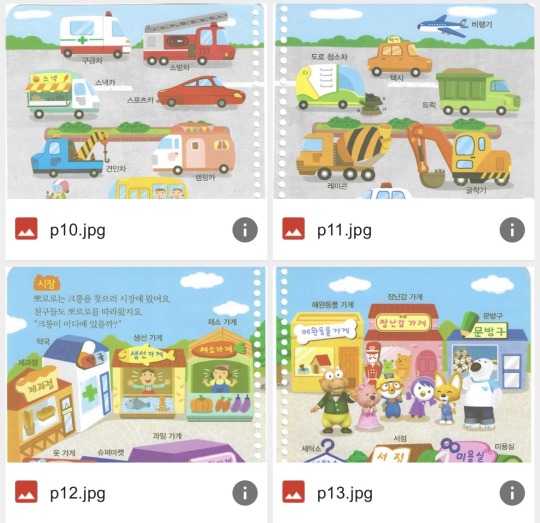
example of grammar breakdowns:
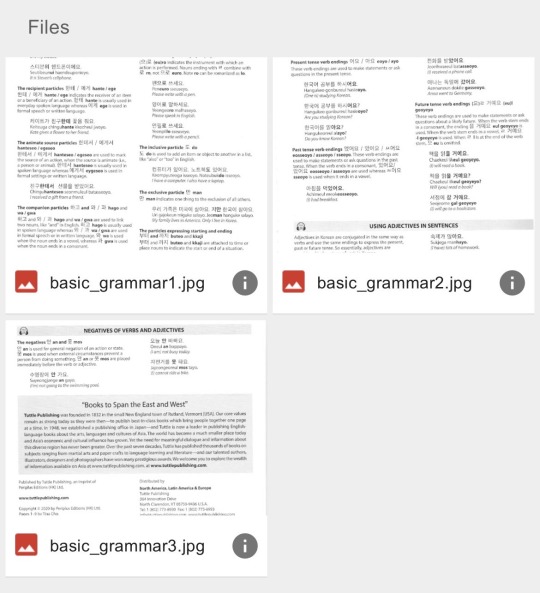
i will be adding material over the coming weeks and continuously as i come across material! updates may be frequent or slow down at times.
note: resources are free, and they’re totally free to share and use! but please do not repost without credit, and because i buy these from my workplace with my own money and spend time scanning them and cleaning them up and organizing them, please consider tipping me as much as you’d like ♥️
here is the link to the drive! (sorry, can’t hyperlink on mobile currently)
enjoy, and thank you in advance! have fun and feel free to ask me any questions—i am a korean studies grad and was a tutor for the beginning korean classes at my university. i am happy to help however i can!
♥️ joey
#ok about to tag the hell out of this sorry in advance#studyblr#study korean#korean#learning korean#hangul#learning hangul#beginner korean#korean study#korean studyblr#korean study notes#한글#한국어 공부하기#한국어공부중#한국어 배우기#korea#korean langblr#korean language#resource#language resources#korean learning#korean learning resource#OK ANYWAYS feel free to reblog like etc#just want to provide some help :)))
2K notes
·
View notes
Text
Semester in SK: Korean Curse Words
안녕하세요 여러분! I’m sharing yet another Instagram post with you all--this one is about a bunch of Korean curse words! Very silly, I know, but curse words are a big part of any language and can be fun to learn about! Of course, be careful when using these and please do not use them often--I’m just sharing them for fun and so you can recognize them if you hear them :) I hope you enjoy! 화이팅!

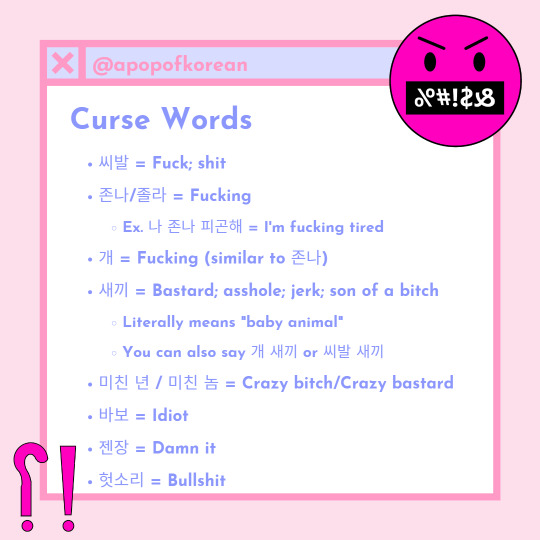
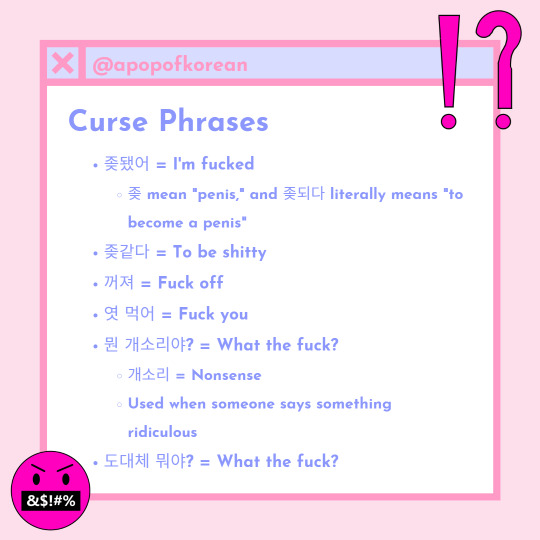

My masterlist
Join my Discord chat here to practice Korean with others!
Follow me on Instagram here for more Korean content!
Get Drops Premium using my affiliate link to expand your Korean vocab!
Check out my Ko-Fi to support this blog and my studies! Thank you for your generosity!
#korean#korean language#korean vocabulary#korean vocab#study abroad#learn korean#learning korean#study korean#studying korean#korean culture#유학#유학생활#한국#한국 문화#어휘#한국어#한국어 공부하기#한국어 배우기#langblr#korean langblr
390 notes
·
View notes
Text
231212 Vocab
반추: rumination, reflection
어떤 일을 여러 번 계속하여 생각함. 또는 그런 일.
The act of constantly thinking about a matter, or such a matter.
역이용하다: turn something to one's own advantage; turn something against itself
어떤 목적을 가지고 있는 것을 그 반대의 목적으로 이용하다.
To use something for a purpose opposed to its original purpose.
어여쁘다: beautiful, lovely
(옛 말투로) 예쁘다.
(old-fashioned) Pretty.
이치: reason, principle, sense
정당하고 도리에 맞는 원리. 또는 근본이 되는 목적이나 중요한 뜻.
A right principle consistent with reason, or underlying purpose or significant meaning.
일구다: create
어떤 현상이나 일 등을 일으키다.
To cause a certain phenomenon, matter, etc.
공통분모: common denominator, something in common
(비유적으로) 여럿 사이에 서로 같은 점.
(figurative) A common point among different people.
궁핍: being poor
물질적으로나 정신적으로 가난하고 여유가 없는 상태.
The state of being materially and mentally poor.
허술하다: shabby; humble
낡고 헐어서 보잘것없다.
Being old and worn out, making it look worthless.
탁상공론: desk theory
실제로 이루어질 가능성이 적은, 헛된 이론이나 논의.
An impractical theory or discussion, whose possibility of coming true is low.
도출: inference
어떤 일에 대한 생각, 결론, 판단 등을 이끌어 냄.
The act of deriving a thought, conclusion, decision, etc., about something.
구현: embodiment, materialization, realization
이념이나 사상, 계획 등을 구체적인 모습으로 나타나게 함.
Making an idea, thought, plan, etc., appear in a concrete form.
#한국어#한국어 공부#공부계#한국어 공부하기#한국어 배우기#new vocab#studyblr#study korean#learning korean#korean#korean vocabulary#south korea#korean language#learning languages#language#langblr#language study#language learning#korean learning#tumblog#tumblr blog#learning#노트정리#공블러
66 notes
·
View notes
Photo

If you're learning Korean, you might have encountered the word "어차피" (eo-cha-pi) at some point. It's a useful word that can be translated to "anyway," "in any case," or "after all." When you use "어차피," you're often indicating that something is inevitable or necessary, regardless of other circumstances.
To use "어차피", you simply need to add it to the sentence.
E.g.
어차피 늦었으니까 천천히 와.
(It's late anyway, so take your time.)
어차피 다른 선택지가 없어.
(There’s no other option anyway.)
그 사람은 어차피 나를 싫어하는 거야.
(That person hates me, after all.)
"어차피" is often used with grammar like ~(으)니까 or -(으)ㄴ/는데 to add more context.
E.g.
어차피 해야 할일이니까 빨리 하고 끝내는게 좋지않겠어요?
(Because it's something you have to do anyway, isn't it better to hurry up and finish it?)
어차피 시간이 없는데 일찍 가는 게 좋을 거야.
(Anyway, since we don't have much time, it's better to leave early.)
어차피 지나간 일이니까 다시 말하지 말아요.
(Since it's a thing of the past anyway, let's not talk about it again.)
어차피 밖에 비가 내리고 있는데 조금더 이야기를 나누자
(It's raining outside anyway, so let's talk a little bit more.)
🌸 🌼 🌻
Support me at: https://koreanlanguageloving.my.canva.site/
#Korean Language#korean langblr#Learn Korean#Study Korean#Hangul#한국어 공부하기#한국어 배우기#한국어 어휘#한국어 연습#한국어#한국어능력시험#한국어공부해요#한국어공부중#한국어공부하기#한국어공부#Korean Vocabulary
344 notes
·
View notes
Text
vocab list: 미술
그림: painting, picture, drawing, sketch, illustration
페인팅: painting (영어)
페인트칠: painting (한국어)
그리다: to paint, draw, sketch a picture
끌다: to pull, draw/attract (someone's attention)
긋다: draw a line
만들다: to make (a movie, book, song), produce, direct (a movie), compose (a song)
사진: picture, photo
영화: picture, video, movie, film
영상: picture, video, image (shown on a screen)
화면: picture, image (space filled by a photo)
그림자: shadow, silhouette, reflection (on a mirror/water)
그늘: shade, dark part
미행: shadowing (secretly following someone to keep an eye on them or get evidence)
느끼다: to feel (experience an emotion in one's mind), realize, being aware of
기분: mood, feeling, atmosphere (the situation surrounding)
감정: emotion, feeling (towards a certain incident or person)
도자기: pottery, ceramics, chinaware (도기 is a bowl made of clay, and 자기 is baked at a higher temperature-1200°C-)
도예: abbreviation of '도자기 공예' -ceramic arts-
도기: pottery, earthenware
회: raw fish, round (ONLY when it's added to a number, aka a counter)
둥근: round, spheroid
차례: order, turn
계속: continuosly, consecutively
형태: shape, form, figure, appearance (of an object)
모양: shape (outer appearance/aspect) -mostly used-
형성하다: to form, build, develop a certain character or form
생기다: to be formed, come into being (something that didn't exist to come into existence)
예술: art (very broad sense, including music, painting, sculpture, architecture)
미술품: art work, fine art, work of art
미술: art (painting and sculpture)
기술: technology, skill, technique
닦다: to clean, scrub, wipe
양치: brushing teeth
붓: writing/painting brush
빗다: to brush/comb one's hair
비디오: video
텔레비전: TV
녹화: video, record, tape, videotape
무비: movie
원: circle; ₩
돌다: to turn, rotate, spin; to go around, circle
그룹: group, a circle (of people)
사회: society, circle
잉크: ink
서명하다: to sign
서명: signature, autograph
먹물: black ink (ink + water), squid ink
광장: square, plaza
사각형: square, quadrangle, tetragon, quadrilateral
평방: square (ej metros cuadrados)
제곱: square (of -maths-)
네모: square
조각: piece (of), slice; sculpture, statue
작품: piece (of music), work (of art); product, production
부분: piece, part, section, portion
하나: one, piece
하나씩: one by one, one at a time, piece by piece
일부: some/any part, portion, section, partially, partly
즐기다: to enjoy (oneself), have fun
하세요: do it, allowing someone to do something
누리다: authority to enjoy what you have in life; to enjoy someone's rights or benefits
즐겁게: delightfully
재미있다: funny, interesting, amusing, entertaining
점토: clay
진흙: mud
춤: dance (dynamic, b-boing, -방탄소년단-)
무용: dance (soft movement -ballet-)
추다: to dance
페인트: paint (pintura)
칠하다: to paint, coat, varnish
물감: paint, dye (to draw a picture or dye cloth)
색칠하다: to paint, color (something)
크레용: crayon
~을 크레용으로 그리다: to draw with crayons
~을 사생하다: to draw exactly as it is (not used in conversational korean)
주변 경치를 사생하다: draw exactly how it is viewed
사생대회: drawing/painting contest
납작한: flat (to be)
평면: plane/flat surface
아파트: flat, apartment
시시한: flat, petty, small minded; insignificant, trivial
한 푼 없는: have no money
포스터: poster
영화계: the film world (-hollywood-)
박막: a thin film (anatomical jargon)
촬영: shooting, filiming
필름: film (영화 필름, 카메라 필름, 휴대폰 액정보호 필름, etc)
행동하다: to act, behave
법률: law, act, legislation
연기하다: to act, perform (personality, behavior, etc of a role); to delay, postpone
행위: act, action (with intention, will)
대행하다: to do something for someone
source: 영단어는 관리다 app

#study#korean#koreanlanguage#koreanstudy#koreanstudying#한국어#한국어연습#한국어공부#한국어공부중#한국어배우기#korean language#한국어 배우기#한국어 공부하기#korean learning#korean langblr#learn korean#korean lesson#korean words#korean voca#korean vocabulary list#korean vocab#korean vocab list#korean vocabulary#한국어 단어#한국어 배우다#한국어 공부#한국어 어휘
293 notes
·
View notes
Text
Collocations with 가리다 (v. to hide)
It's been a while since I posted something from that collocations book I shared!
1. 건물에 / 인파에 / 눈물에 / *베일에 = be hidden
*베일 (veil) can be literal or metaphorical
그 사람의 모습은 인파에 가려서 보이지 않았다. // The person's figure was hidden by the crowd.
2. 시야를 / 얼글을 / 해를 / 입을 = block one's view with one's hands, etc.
너무 더워서 손으로 해를 가리고 걸었다. // It was too hot, so I blocked the sun with my hands and walked.
3. 공과 사를 / 승부를 / 우열을 / 시비를 / 시시비비를 = distinguish between right and wrong
회사에서는 공과 사를 가려서 일을 해야 한다. // You have to separate public and private matters when you work in a company.
4. 물불을 / 밤낮을 / 수단과 방법을 / 시간과 장소를 + 가리지 않다 = distinguish and select one
형은 밤낮을 가리지 않고 공부를 해서 1등을 했다. // He studied day and night (didn't differentiate between day & night) and got 1st place.
관용 표현 // Idiomatic Expressions
낯을 가리다 = to be shy around strangers
사실 저는 낯을 많이 가려요. // Actually I'm very shy around strangers.
이제 낯 안 가려요? // You're not shy anymore?
음식을 가리다 = to be a picky about food
가리는 음식 있어요? // Is there a food you don't eat?
음식은 잘 가리지 않아요. // I'm not really picky about food.
71 notes
·
View notes
Text
Sad to see the loss of one of the largest free Korean language learning resource with Talk To Me In Korean moving to paid-only platform.
Since starting to learn Korean in 2016, I’ve witnessed huge improvements in the accessibility of free resources for Korean learners. TTMIK has been a huge part of the popularisation of Korean language learning.
My favourite free alternatives to TTMIK for learning Korean:
HowToStudyKorean.com (my all time favourite - I’ve used them since day 1)
King Sejong Institute textbooks (available for free online through 누리 세종학당)
#learning korean#korean language#korean#talk to me in korean#ttmik#한국어#한국어공부#한국어 공부하기#한국어 공부#한국어 배우기
39 notes
·
View notes
Text
Two new Korean words
본말 : original word, at its original length
준말 : short form, abbreviation
예를 들어서 ”이야기“ 쓰면 본말인 반면에 “얘기” 쓸 때마다 준말이예요 ! 이제 이해되시죠? :D
#korean language#한국어 공부하기#한국어 배우기#한국어 공부#한국어 연습#한국어#한국#coréen#korean#korean studying#vocabulary#hobakvocab
30 notes
·
View notes
Text



sept 01, 2023
for some reason i am always way more productive in a café than at home
#also there is this one hot guy who seems to be a regular#so maybe one day i will have the confidence to talk to him JDBDJBCDJ#studygram#study aesthetic#studyblr#studyspo#study motivation#bookblr#bookstagram#duolingo#học tiếng việt#korean langblr#langblr#langvillage#polyglot#한국어 공부#한국어 공부하기#한국어#한국어 배우기#cursed bunny#bora chung#中文#汉语#学习汉语
35 notes
·
View notes
Text
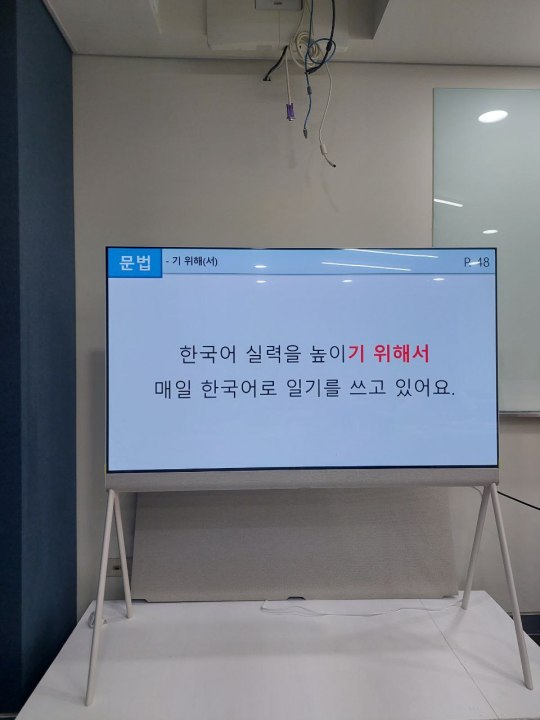
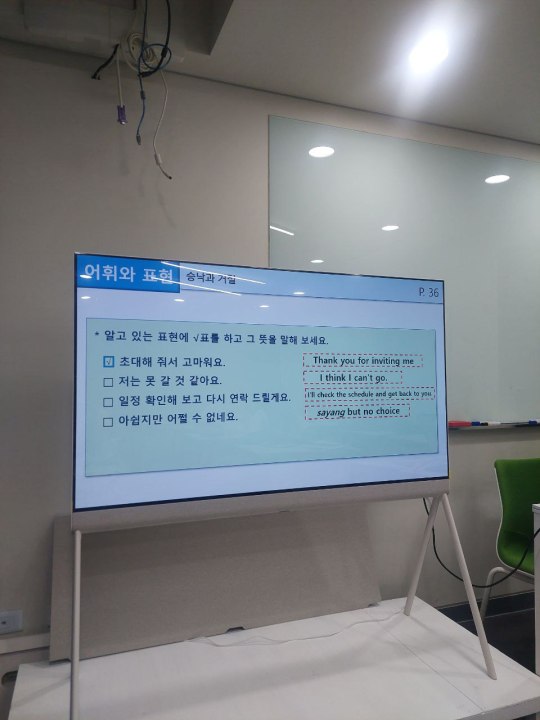
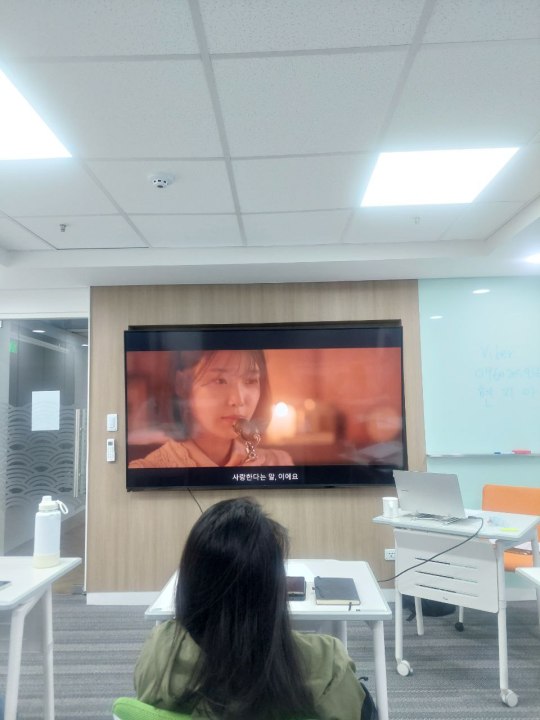
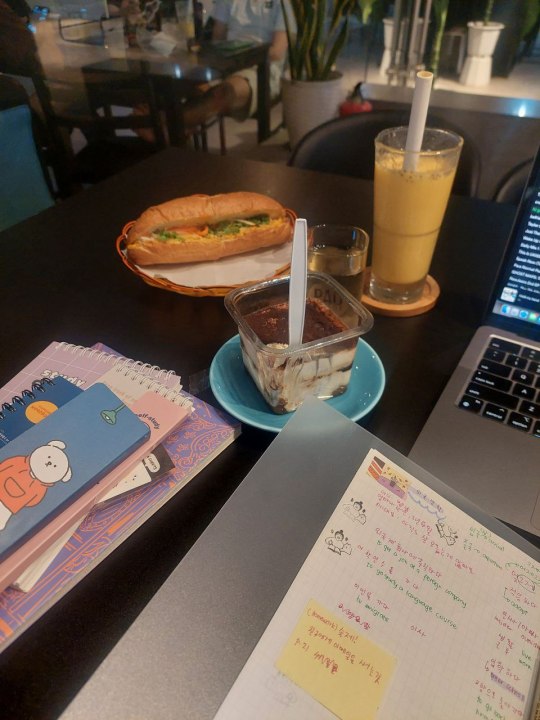
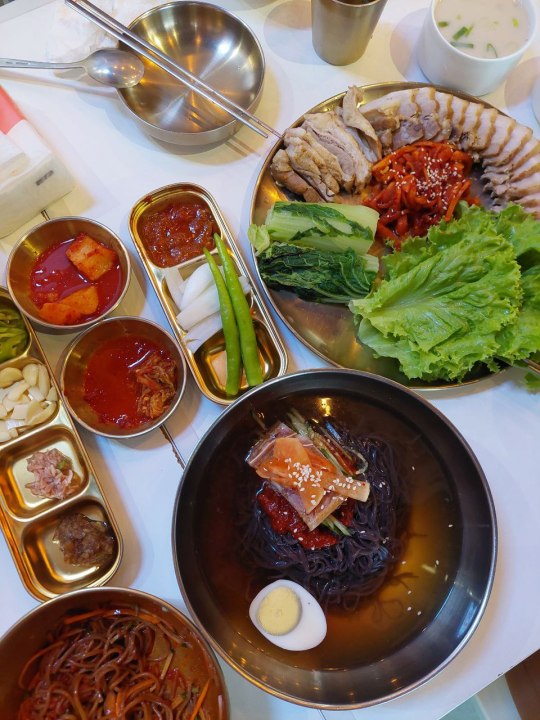
한국어 실력을 높이기 위해서 매일 한국어로 일기를 쓰고 있어요.
As I have mentioned, September was a jam-packed month. I continue to upskill in my various interests and hobbies and pursue opportunities that I see myself enjoying - which is true most of the time. There's just so much homework to do. 🙈
I started studying Korean again to pursue translation in the future. Korean Cultural Center in the Philippines offered free cultural and language classes for the final term this year, and I got a slot for one of their classes. Registration at KCC is competitive. I initially aimed for two classes, but I am still lucky that I got into one of them. With King Sejong Institute, students complete 60 hours of language learning to graduate. Classes are happy, free, confusing, and seemingly complex at the same time 😉 but our teacher helps us understand each lesson before moving to another topic.
Oh, and we get to eat together after class, too!
I'm also studying Italian. But that's a whole other, yet equally confusing story. Languages are already mixing up in my head. But I still think that I want to learn more!
여기까지만 이야기를 할게요. 다음에 봬요!
#korean#korean language#language#language learning#language stuff#studyblr#languageblr#language blog#langblr#langblog#한국어#어학연수#한국어 공부하기#dailyprompt#iu#lee jieun#student#language student#student life#philippines#makati#bgc#cafe#cafe aesthetic
16 notes
·
View notes
Note
What is the difference between -게 하다 and -게 되다?
Great question! First, we need to understand that 하다 is active whereas 되다 is passive! Your next question might be, “but omg, SK101, I’m not good at English grammar, too; what the hell is passive and active?”
Another great question!
The active voice is when the speaker/subject performs the action or is described directly–they did it, caused it, performed it; you’re gonna see people commonly use these ways to explain the active voice. In English, the active voice can look something like this:
I studied Korean; (저는) 한국어를 공부했어요
As you can see, I (the subject) am the one that studied Korean of my own volition. I caused the “Korean studying.”
The passive voice is when the speaker/subject does not perform/cause/do the action. Instead, the subject is affected by the action/performance. I understand this may be difficult to understand, so I’ll spend more time on this.
When can you use the passive voice?
When we have more interest in the object that experiences the action
When we don’t know (or don’t want to express) who performed the action (this is an academic loophole when we didn't do the proper research to support a claim)
When we want to emphasize the action!
The passive voice is not grammatically incorrect (take it from a linguist and someone who minored in creative writing). You will hear people say that the passive voice is not good or is ungrammatical (some bs like that). Even in Korean, the passive voice is entirely natural and used in everyday contexts.
The passive voice in Korean may look like this:
한국어가 (저에게) 공부됐어요; Korean was studied (by me)
The prepositional phrase “by me; 저에게” shows that we know who studied Korean. This may still be confusing, so let me give you another example:
부엌을 청소했어요; I cleaned the kitchen.
부엌이 청소됐어요; The kitchen has been cleaned.
Let’s add more context to the sentence to understand the situation better.
집에 도착했을 때 부엌을 청소했어요; When I got home, I cleaned the kitchen (meaning, I saw the dirty kitchen and cleaned it)
집에 도착했을 때 부엌이 청소됐어요; When I got home, the kitchen was cleaned (meaning, someone (unknown or otherwise) cleaned the kitchen when I was out)
*gasp!* Yes, by now, you've noticed that 이/가 goes with passive!
Now, onto your question: what's the difference between -게 하다 and -게 되다?
-게 하다: causative
The causative aspect shows that A causes B to happen. Pretend you have a younger sibling–here are some examples:
동생은 저를 늦게 했어요; My sibling made me late
저는 동생이 문제를 이해하게 했어요; I made them understand the problem
저를 귀찮게 했어요; You (the sibling) bothered me!
(저는) 동생을 화장품으로 예쁘게 했어요; I made my sibling pretty with makeup
A (동생/저) causes B to happen. B does not mean the recipient (저/동생) of the action – B represents the action.
-게 되다; to become (passive)
This grammar point shows that B changes A! Let’s use the examples from above.
동생이 화장품으로 예쁘게 됐어요; my sibling became pretty with makeup
동생 때문에 제가 귀찮게 되었어요; my sibling has been bothering me
문제가 동생에게 이해하게 되었어요; my sibling came to understand the problem [more literally; the problem was understood by my sibling]
동생 때문에 제가 늦게 되었어요; I became late because of my sibling
Now, I'm sure you've noticed that there are two spellings of a conjugated '되다'. The only difference between '되었어요' and '됐어요' is that '됐어요' is a contraction of '되었어요'. You may have other Korean learners attempt to tell you that you write one [되었어요] and speak the other [됐어요]. This isn't not true; it's just not a rule written in stone. You are very much able to write the contracted '됐어요' instead of the regular '되었어요'. In fact, native Korean speakers do this all the time. It would be like saying we shouldn't write any English contractions because it's not grammatically correct--it's just wrong. The rules of '되다' are more complex than just written and spoken, but that's a blog for another day.
I hope this helped answer your question! If you're still confused, don't hesitate to send me another ask or pm me! I'm always open to clearing up any confusion or directing you to a source that may help!
Happy Learning :)
~ SK101
#korean blog#korean#korean language#learn korean#study korean#korean langblr#한국어#한국어 배우기#korean language blog#langblr#kblr#korean langauge#south korean#한국어 공부하기#한국어 문법#한국어공부#korean words#studyblr#-게 되다하고 -게 하다 차이#한국어 동사#문법#ask#물어보기 아논#물어보는 질문#질문#한국어 질문
197 notes
·
View notes
Text
안녕하세요~~ 요즘 일기 안하네요. 죄송해요. 며칠 전에 thanksgiving이였어요. 가족이랑 재밌게 놀았습니다~ 여러분 잘 지내고 있음 좋겠어요. 저는 잘 살고 있고 재밌게 행복하게 살고 있습니다 ^^
-G🧸
7 notes
·
View notes
Text
Hanja Lesson: 무
안녕하세요 여러분! Hi everyone! Here is yet another Hanja lesson that I posted on my Instagram a while ago. This one is about 무--I hope it's useful! Let's start :) 시작해 볼까요?

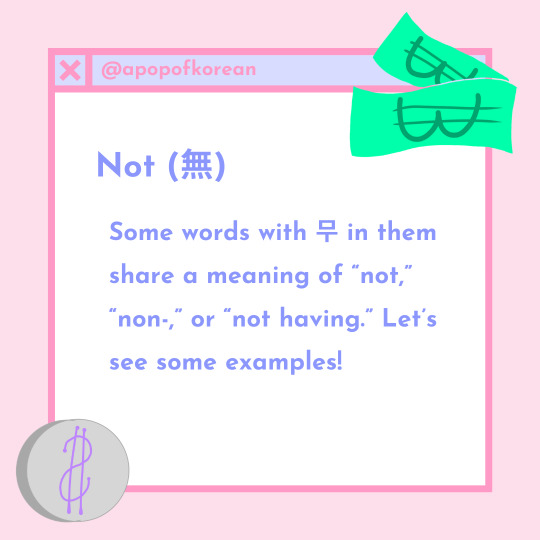
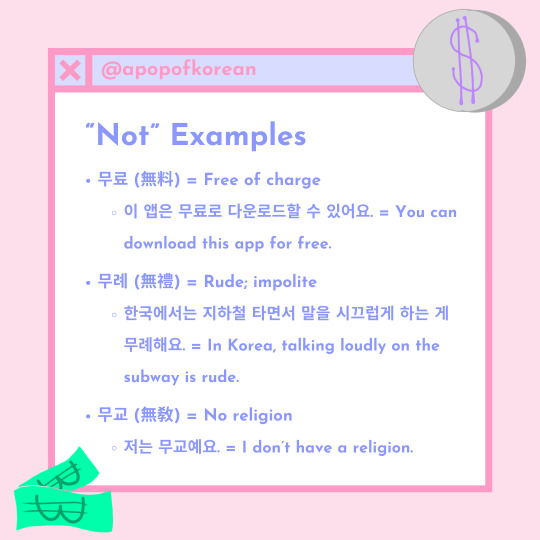
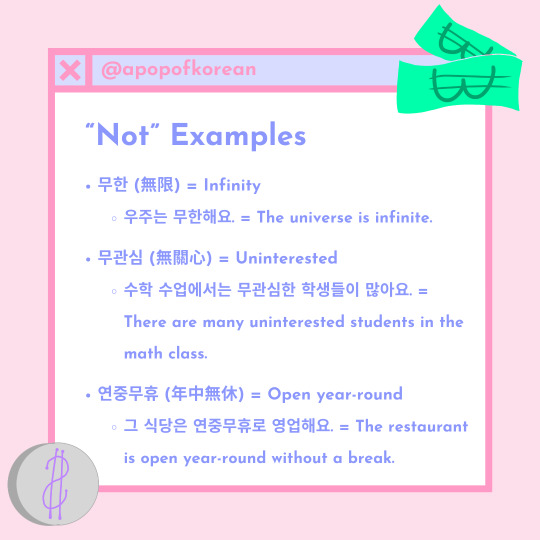
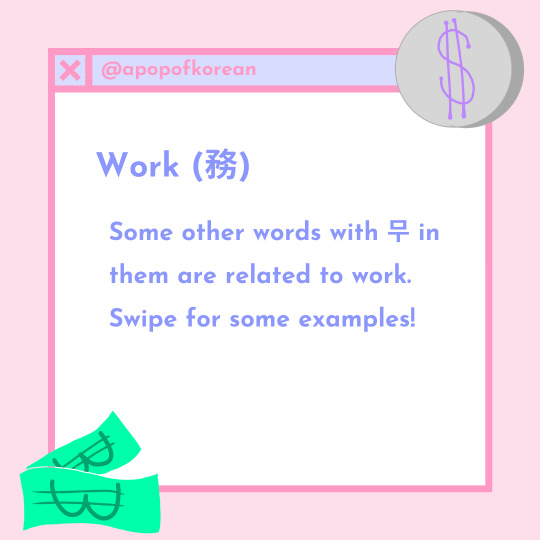
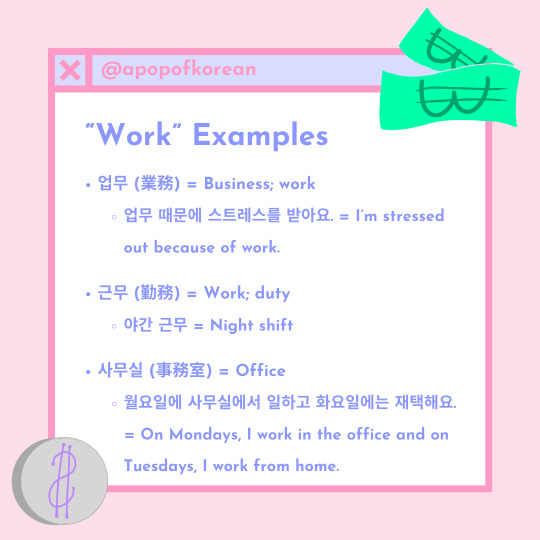
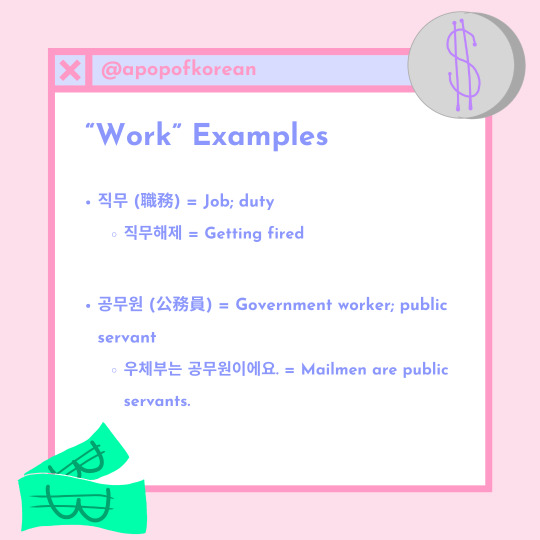
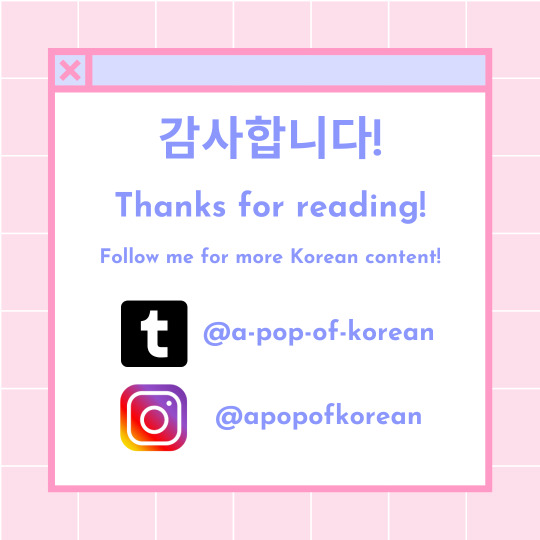
My masterlist
Join my Discord chat here to practice Korean with others!
Follow me on Instagram here for more Korean content!
Check out my Ko-Fito support this blog and my studies! Thank you for your generosity!
#korean#korean language#learn korean#learning korean#study korean#studying korean#hanja#hangul#korean vocab#korean vocabulary#한자#한국어#한글#한국어 배우기#한국어 공부하기#langblr#korean langblr
89 notes
·
View notes
Text
New Vocabs i learned this week
i heard this on several video on youtube, variety shows, and my interaction with friends.
자아도취: narcissism
측근: close person
무리수: being irrational/going to far
원어치: original place, original position
대들다: defy, resist
시누이: sister-in-law
개판: mess
정정당당하다: fair
생색내다: show off, boast
얍삽하다: sneaky
이질적: being heterogeneous
거무튀튀하다: blackish, somber
우두커니: blankly, vacantly
허심탄회하다: frank, open-minded
의형제: half-brothers
후천적: being acquired
주시하다: watch
글피: two days after tomorrow/three days from today
그글피: tree days after tomorrow/four days from today
#한국어#한국어 공부#공부계#한국어 공부하기#한국어 배우기#korean#learning korean#study korean#studyblr#korean vocabulary#new vocab#새 단어
82 notes
·
View notes
Photo

아무리 바람이 세차게 불어도
산은 바람에 고개를 숙일 수 없다
No matter how the wind howls,
the mountain cannot bow to it
- from Disney Movie: Mulan
✏️ 𝐕𝐨𝐜𝐚𝐛𝐮𝐥𝐚𝐫𝐲:
아무리 (adv): no matter how, however, whatever
바람 (n): wind
세차다 (adj): strong, rough
불다 (v): blow
산 (n): mountain
고개 (n): head
숙이다 (v): bow, bend
✏️ 𝐆𝐫𝐚𝐦𝐦𝐚𝐫:
1. (아무리) A/V-아/어도 grammar = even if, no matter how ~a situation occurs regardless of the previous action
E.g.
아무리 바람이 세차게 불어도 = No matter how strong the wind blows
2. V-(으)ㄹ 수 없다 grammar = can't (do V)
E.g.
고개를 숙일 수 없다 = can't bow down
🌸 🌼 🌻
Support me at: https://koreanlanguageloving.my.canva.site/
#Korean Quotes#Korean Phrases#Learn Korean#Study Korean#Hangul#Motivational Quotes#Disney Quotes#Korean Language#korean langblr#인생명언#한국어공부중#한국어 공부하기#한국어공부#한국어 문법#한국어#한국어능력시험#한국어배우기#한국어배우#한국어 배우
105 notes
·
View notes
Text
vocab list: 신체
눈: eye, eyeball, eyesight; snow; gradation, marking, graduation
시선: one's eyes, graze, eye-catching
안구: eyeball
쳐다보다: to look up, look/stare (at), gaze (at)
눈길: to watch something/someone; street made of snow stick
귀: ear
청각: sense of hearing
청력: hearing (hearing capability that can get lost with the years)
이삭: ear, head of the rice, barley, etc where a flower opens and the fruit comes from
눈썹: eyebrow
눈사을 찌푸리다: to frown
심장: heart
마음: heart, mind, personality
가슴: heart, chest, breast, bust, boobs
중심: center, heart, middle; focus, nucleus, core; emphasis, importance
머리: head, hair; brain, mind, intelligence
지도자: leader, head (of)
머리카락: hair
털: hair, fur, heather, fluff
섬유: fiber, textile
목: neck, throat
몸: body (pure korean)
신체: body, physical (chinese derived, used more in formal situations)
단체: organization, association, society, group, party
시체: dead body, corpse
몸매: body figure/shape
무릎: knee
무릎치기: idiomatic expression meaning to figure sth out/to realize; knee breenches (male pants that go to the knees)
무릎으로 치다: hit with the knees
발: foot, paw, step
걷다: to walk
기슭: foot, base, border, edge (mountain, hill, river, etc)
보병: foot soldiers, infantry (play the main roles in the army, move by foot and attack enemies with rifles, etc)
발가락: toe
발끝: tiptoe
손: hand
주다: to give (an item to someone or a qualification, right, score)
도움: help, aid, assistance, support
반수: half of a number divided equally by 2
맡기다: to assign, charge (someone the responsibility for a certain role or work); entrust, leave something with
손가락: finger
지적하다: to point out, indicate, comment, criticize
손톱: (finger) nail
못: nail (clavo)
분석하다: to analyze
잡다: to hold (something in one's hand and not let it go); arrest, catch, capture (someone)
어깨: shoulder
책임을 지다: to assume/bear/shoulder/take the responsibility; hold oneself responsible for
갓길: side road for emergencies
얼굴: face
직면하다: to confront, face, come face to face with
표정: face expression
입: mouth, lips, one's taste
말: word, language, speech, talk
입구: entrance to/of, entry, way in
치아: tooth (humans and animals, hospitals use it)이tooth (expression for naming the different parts of the teeth, like molars; it's rarely used by itself)
톱니: tooth of a saw
코: nose
후각: sense of smell
팔: arm
무기: weapon, armaments
무장하다: to be armed, militarized
부문: section, field, division
팔걸이: armrest part of a chair
허벅지: thigh
source: 영단어는 관리다 app

#study#korean#koreanlanguage#koreanstudy#koreanstudying#한국어#한국어연습#한국어공부#한국어공부중#한국어배우기#korean language#한국어 배우기#한국어 공부하기#korean learning#korean langblr#learn korean#korean lesson#korean words#korean voca#korean vocabulary list#korean vocab#korean vocab list#korean vocabulary#한국어 단어#한국어 배우다#한국어 공부#한국어 어휘
144 notes
·
View notes